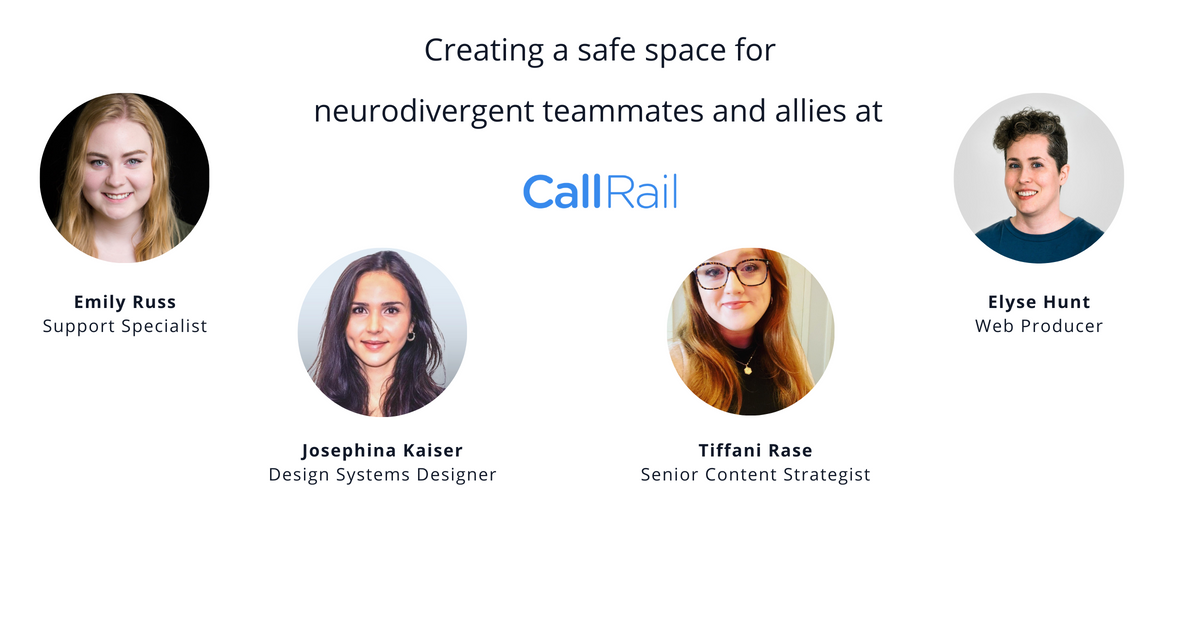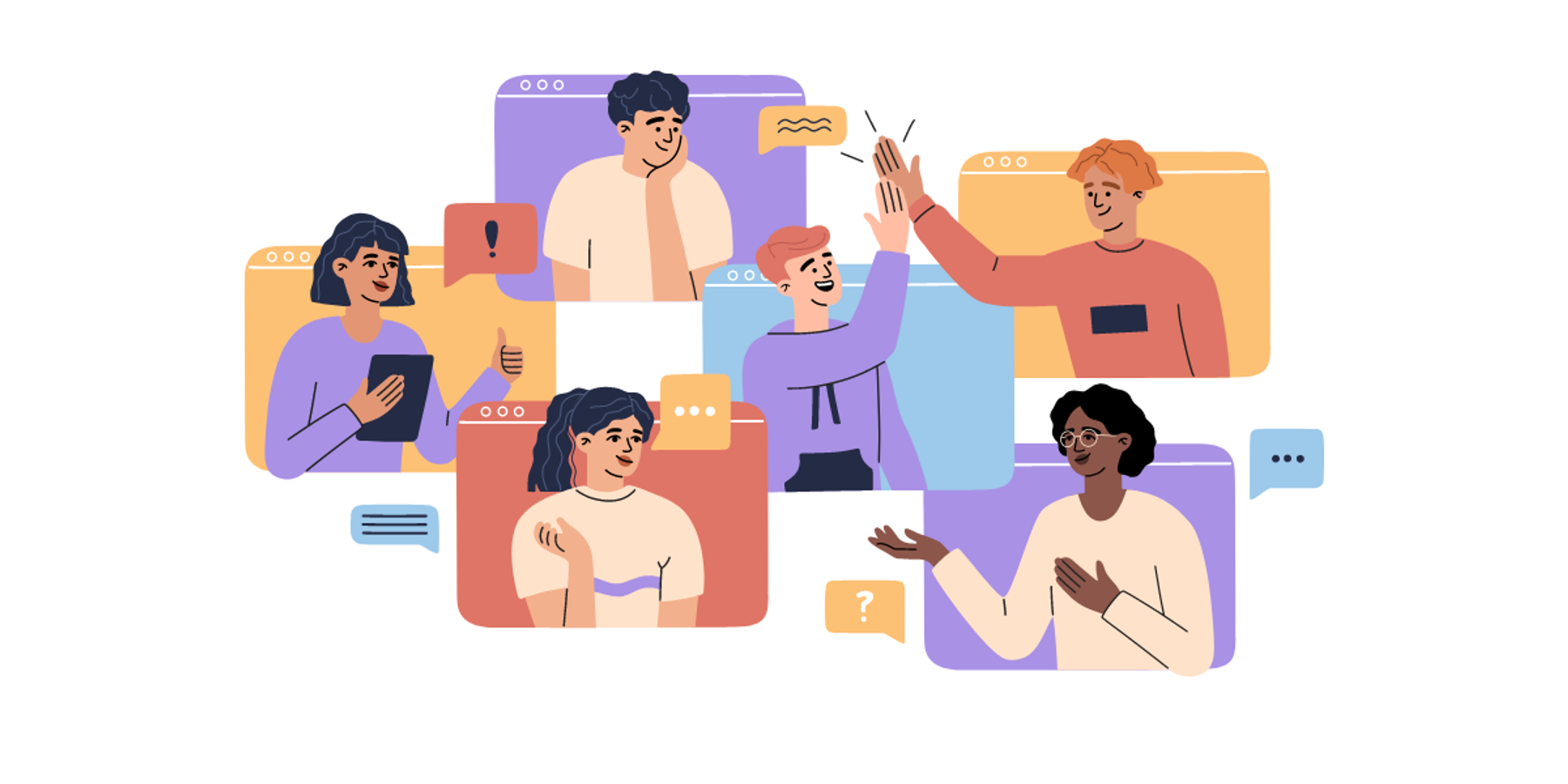At CallRail, Divergent Minds is an Employee Resource Group (ERG) dedicated to providing resources, education, and support for people who identify as neurodivergent and their allies.
The ERG was founded in early 2023 by just a few team members. By the time we sat down with Divergent Minds’ leaders at our Visible & Invisible Disabilities and Neurodivergence summit nine months later, the ERG had 34% participation across the entire company.
With such undeniable success, we asked the ERG leaders Tiffani Rase (Senior Content Strategist), Josephina Kaiser (Design Systems Designer), Elyse Hunt (Web Producer), and Emily Russ (Support Specialist), to share more about the impact of their work with Divergent Minds.
The inception
After many years of struggling with mental health, Tiffani shares how she “had this desire to be transparent about [her] experience.”
“I wanted to chip away the negative stigma that I still had within myself,” she says. “And also share that with a group of supportive people who understood.”
She decided to reach out to colleagues to gauge their interest in an ERG dedicated to employees who are neurodivergent and inundated with positive reinforcement. She took the idea to CallRail’s Talent and Culture team and received their stamp of approval.
“Pretty quickly after that, I reached out to my team to ask if anybody wanted to take the journey with me,” she recalls. “And from there, it moved very quickly. We officially kicked off in January, and we’ve grown a lot since then.”
“We really just wanted to create a safe space for people who are neurodivergent,” adds Josephina, reflecting on the inception of Divergent Minds.
In prior workplace experiences, Josephina noticed a stigma around mental health transparency, leading to fear of judgment. She hoped, along with her co-founders, to minimize fear across CallRail.
“We saw an opportunity to bring more awareness and shed light on mental health in the corporate world,” she says.
High-impact initiatives
Nine months into its inception, Divergent Minds has hosted a slew of quarterly events like conversations with guest speakers and lunch chats around various mental health and neurodiversity topics.
One of their biggest accomplishments was organizing a Mental Health Awareness Month with participation from 57% of the company.
“We hosted challenges like ‘Get Out and Smell the Roses,’ where people went out and posted pictures outside in nature. Then, there was the Virtual High-Five challenge where we gave a little prize to participants who participated the most,” explains Josephina.
Elyse adds that a personal highlight for her was the implementation of a quiet room in the office.
“Our company is fully remote, so three or four times a year, we have an in-person week where everyone comes into the Atlanta office and it can get a little chaotic when suddenly everyone is on-site,” says Elyse. “So we piloted the ‘ChillRail,’ a room where people could go and relax…. It was very successful, so we’re going to have two permanent spaces in the office moving forward.”
Fostering a safe & open culture
The impact of Divergent Minds can be seen in its members’ feedback and the shifts in the overall workplace culture.
“I’ve noticed that other people are just as passionate about this as we are,” says Emily. “It’s removed a lot of the barriers I typically would feel around talking about mental health or having conversations that might be too personal. Now, I have the space to do it.”
“It’s comforting knowing that you’re not the only one who struggles sometimes and knowing there are people who are not ashamed to talk about it openly is refreshing.” – Divergent Mind member
Elyse adds that it's heartwarming to see people’s posts in the Divergent Minds Slack channel.
“Somebody asked a question the other day about a certain medication. And somebody else just posted today, unprompted, a video about highly sensitive people,” she says. “It’s really nice to see our members take ownership.”
With nine months under its belt and years to go, Divergent Minds’ impact will continue to expand — building an even stronger culture of safety and acceptance at CallRail.
“If there’s one thing we want everyone to take away from this conversation today, it’s that you’re definitely not alone. If you’re experiencing an invisible disability, advocating for yourself will always be worth it,” says Emily. “And if you’re interested in setting up an ERG, just do it.”
To hear the full conversation, “From Idea to Impact: The Journey of Divergent Minds ERG in Promoting Mental Wellness,” watch the recording here. And to explore career opportunities at CallRail, check out their company page.




